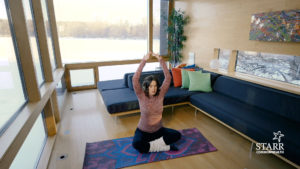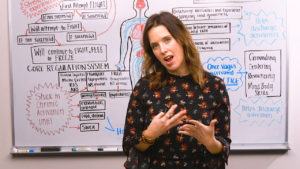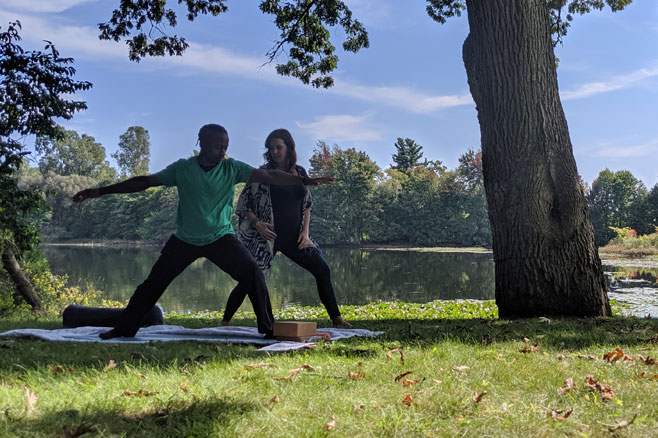Leading to the release of her new course, Practicing Resilience, Erin Reed will be guiding readers through her best advice for taking care of one’s self. As professionals shoulder the burden of their students’ or clients’ trauma, it is paramount they keep their own health in mind. Read below for Reed’s first tips on this critical balance.
Click here for Part 2 and Part 3.
Your new course Practicing Resilience will be out soon. What can practitioners who take this course expect?
I’m really excited about this. It’s going to look very different from our traditional courses. Those are done in 6 hours. This isn’t a training where you’ll simply sit and learn. It’s meant to be taken over the course of 6 weeks (at your own pace, of course) as you build in physical and mental self-care. Each section will have a theme, including a physical practice—a breathing exercise, a meditation, or reflection activity. As you learn to build in practices for physical self-care, mental and emotional self-care, and reflection, you’re then able to integrate those activities that you do over that time to create a really solid self-care plan. I can’t wait to share it with everyone!
Most of Starr’s courses focus on the needs of children, do we really need a course focused on self-care for practitioners?

It’s essential. It’s non-negotiable, especially when true trauma-exposure responses like compassion fatigue, vicarious trauma, and just good-old-fashioned burnout are so prevalent today. Those are really common responses to the exposure that teachers, clinicians, doctors, and anybody else in a helping profession are absorbing all the time. Most of the time we aren’t conscious to it, as we are so focused on the other person’s experience that we’re neglecting our own needs. With today’s pace of life, we don’t make time for ourselves. If you have five things on your calendar, the first one you get rid of is often what you wrote-in for yourself. We are doing this important work and not seeing ourselves in that work. When you are in a state of stress like that, and it’s chronic and prolonged, it’s affecting every aspect of your life—your ability to feel compassion and your ability to remember what even got you into this work to begin with. We are often re-experiencing somebody else’s trauma experience. We have to acknowledge that we’re being exposed to trauma, and then in order to counteract that we have to do something for ourselves. It is a mind-shift and crucial to being trauma-informed. In any organization, we need to move away from the “pull yourself up by your bootstraps” mentality and establish a climate that promotes self-care, and where we work together to make it a priority.
This is so much more than simply acknowledging “Oh I’m so stressed!” It is a psycho-physiological response that you’re having. And even if you’re not consciously recognizing it, your body is going to start telling you. So when many states are having things like teacher shortages or when we see social workers who are just completely at the end of their ropes, that’s when we have to dial that back and say “How I am able to show up to my job everyday matters” and “What am I really going to intentionally do about it?”
I think the biggest barrier we have is our time. When we live in a society that prizes achievements and never stopping—the ever-accelerating rate of information exchange—the key is coming back and saying “Well actually to be trauma-informed and truly focused on resilience is something that we do together.” “Not only will I start to value my own time and care for myself, but I’ll help you value your time too.” And to do this from the top down in organizations, a lot of times it’s a big mind-shift.
How do we prioritize self-care during the work day?

Prioritizing self-care doesn’t mean we won’t still be productive. In fact, it can be argued we would be more productive! In the same way that we advocate for kids to not lose their recess, it’s sort of like we’re advocating for the adults to not lose their recess either. We must place that value on our own play and joy—in our own nurturing. Because if we’re not doing that then how are we going to provide that for other people? When we can’t, that’s when you see a school climate take a huge dive. We see the teachers dragging themselves into school every day with nothing left to give. So I think a huge piece of practicing resilience is just helping people to realize it’s really important, when maybe we’ve grown up thinking what’s most important is just our achievement. Keep in mind, it’s not just a hedonistic blowing off of steam. It’s more of a deeper dive into what you value. When we’re built to survive and then exposed to trauma, we will always have a light in our brains focusing on all the bad stuff that’s happening in order to remember how we survived it. So to counteract that we have to take time to shine that same light very intentionally on what makes us feel alive and joyful in order to balance that experience.
What are some tips for implementing self-care in my organization?
For this month, we should simply identify the sources of our joy and what’s going well in our lives. Maybe it’s a short list at the moment, but I guarantee if you take 5 minutes to really focus, that list will grow longer than you may have realized.
The next step is simply finding 5 minutes, listen to your breathing, and remind yourself of those joys. While it’s a small step, the power to refocus that comes along with those few minutes may completely change the trajectory of your day. Once you can prioritize those 5 minutes for yourself, encourage those around you to do the same. This small step is digestible, but can be built upon in important ways in the workplace.


